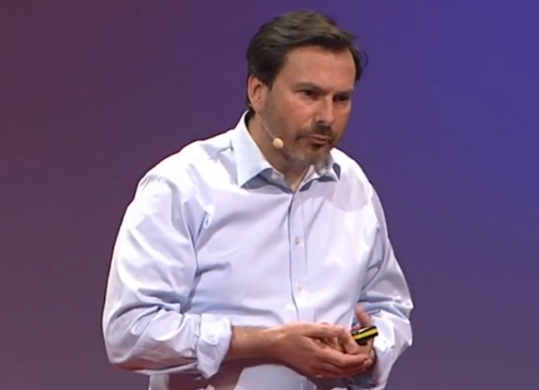But actually, aren't most of us not really so very good at empathy?
但事實上,我們大多數人難道不是缺乏同情心嗎?
Oh sure, we're very good at empathy when it's a question of dealing with people who kind of look like us
當然,我們非常有同情心,當問題出在那些跟我們長得差不多,
and kind of walk and talk and eat and pray and wear like us,
走路、說話和祈禱的方式差不多,衣著也差不多的人,
but when it comes to people who don't do that,
但當問題出在那些不那樣做的人,
who don't quite dress like us and don't quite pray like us and don't quite talk like us,
那些跟我們衣著不同的人,祈禱方式不同的人,說話方式不同的人,
do we not also have a tendency to see them ever so slightly as cardboard cutouts too?
我們豈不是傾向于把他們當成紙片人嗎?
And this is a question we need to ask ourselves.
這是我們需要問自己的問題。

I think constantly we have to monitor it.
我認為我們需要不斷地監督自己。
Are we and our politicians to a degree cultural psychopaths?
我們和我們的政黨某個程度上 是不是文化精神變態?
The third reason is hardly worth mentioning because it's so silly,
第三個原因都不值一提,因為它太白癡了,
but there's a belief amongst governments that the domestic agenda and the international agenda are incompatible and always will be.
但政府間有一種想法,那就是國內事務和國際事務是不兼容的,并會一直如此。
This is just nonsense. In my day job, I'm a policy adviser.
這是無稽之談。我的工作是政策顧問。
I've spent the last 15 years or so advising governments around the world,
我過去的15年左右都在世界各國的政府里做顧問,
and in all of that time I have never once seen a single domestic policy issue that could not be more imaginatively,
整個這段時間我從沒見過任何一個國家政策問題
effectively and rapidly resolved than by treating it as an international problem,
會不比國際問題能夠更具想像力的、高效并快捷的解決了。
looking at the international context, comparing what others have done,
看看國際大環境,比較其他國家是怎么做的,
bringing in others, working externally instead of working internally.
請別人進來,外部合作,而不只是內部工作。











